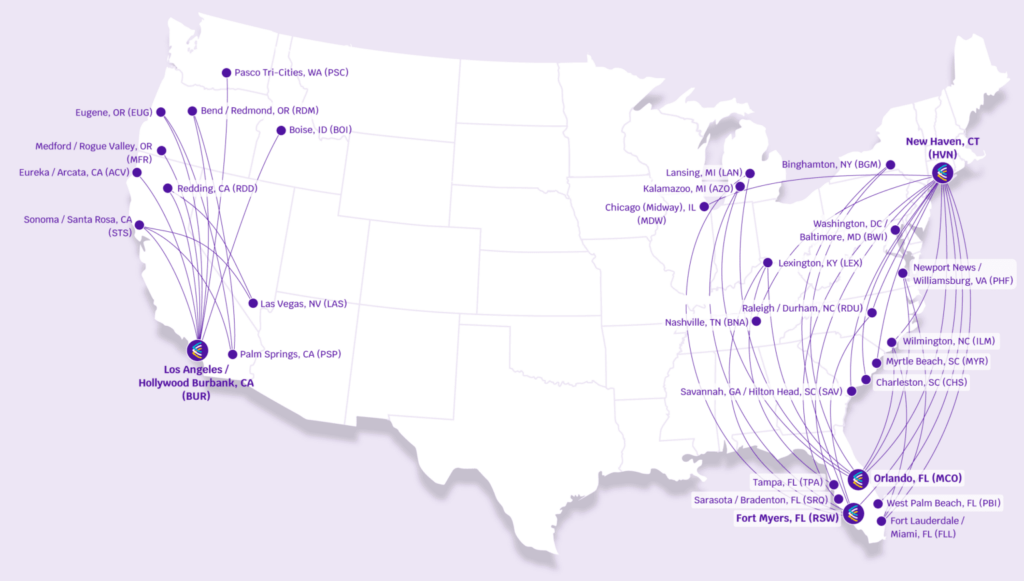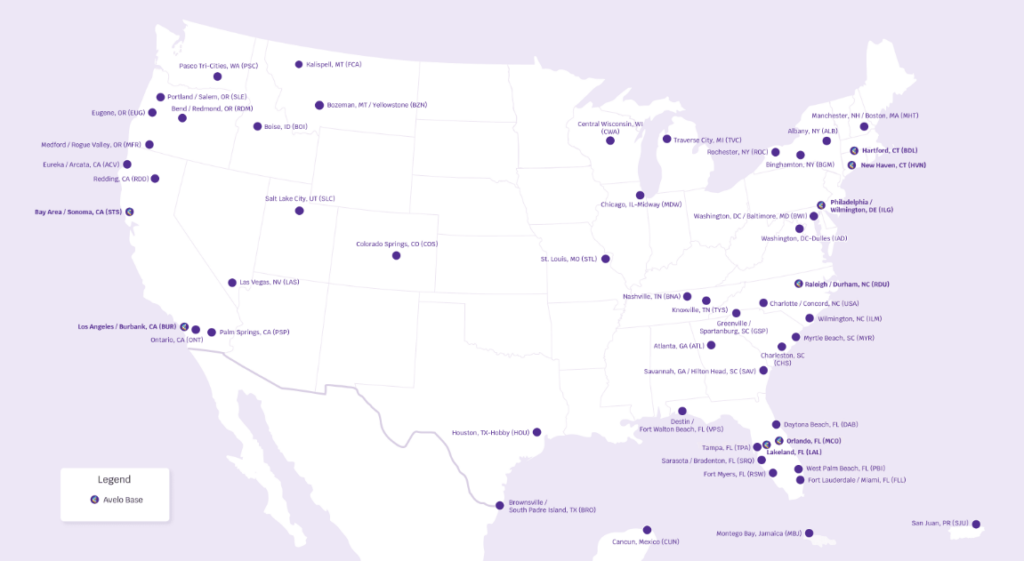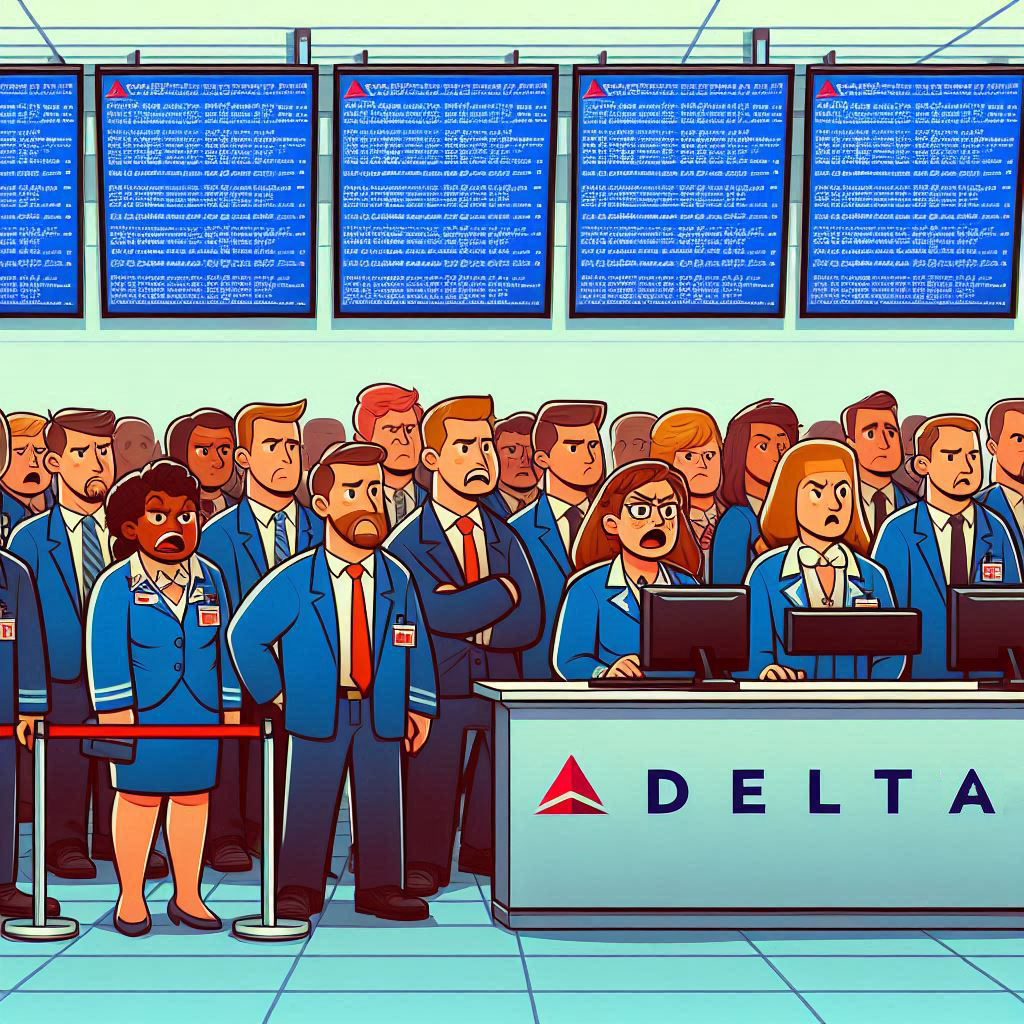The Main Squawk: Delta has its worst operational meltdown ever
Delta’s horrific recovery from the CrowdStrike outage that occurred on Fri, July 19, was by-far the worst operational failure the U.S. airline industry has seen since the Southwest holiday travel meltdown in 2022. While the faulty update CrowdStrike pushed to its security software was certainly what sent Delta—and virtually every other airline worldwide—down a path of cancelling flights by the hundreds per hour, Delta cancelled more flights in the three-day period following the debacle than it cancelled in all of 2018 and 2019 combined. (By comparison, Southwest and American resumed normal operations by the end of the day that Saturday, and United completed its recovery by that start of its operations on Monday.)
If the cancellations themselves weren’t enough to put a dent in every passenger’s thirst for SkyMiles, Delta started turning away unaccompanied minors on Sunday without notice to parents or guardians, stranding children at destinations across the country without a way to get home. Not even Southwest went to this extent when it had its meltdown in 2022.
It wasn’t until Wednesday night that Delta managed to get its cancellation figure under 500 flights for the day, when it finally agreed to reimburse passengers for last-minute arrangements they made to get to their destination.
CEO Ed Bastian told investors on Wednesday that it expects to take a $500 million hit because of the crisis, and mentioned that the blame rests solely on Microsoft and CrowdStrike, provoking Widget pilots everywhere to encourage him to sue the tech giants in an effort to guarantee their profit sharing for the year.
Southwest is ditching open seating and will start assigning seats at some point in 2025. What was once a 50-year-old tradition, that was never complete without at least a few passengers using every spare article of clothing they owned to squat seats for the rest of the members in their party, is coming to an end. The change comes on the heels of the Airline’s own research which showed that over 85% of customers prefer assigned seats, and that if given the option to choose a seat with extra legroom, passengers will buy it… all of which were suggested by Activist investor Elliott in their infamous June 10 letter earlier this year.
The Airline reported a modest $367 million profit in its Q2 earnings report, but offered a weaker outlook for the second half of the year.
While the exact details of its assigned seating policy remain to be seen, the expectation is that they’ll be announced at the Airline’s Investor Day in late-September.
Southwest will also begin a 24-hour operation in February 2025 with the introduction of redeyes from Las Vegas, Los Angeles, and Phoenix to Baltimore, Orlando, and Nashville, prompting all of its pilots better learn their bidding strategies for the months ahead.
American reported record revenue for Q2 of $14.3 billion, albeit with a bottom-line figure of $717 million which is roughly half the size of what Delta and United posted earlier this month.
While the carrier had a strong first-half of the year, it remains burdened by some of the highest labor costs in the industry which include former CEO Doug Parker’s victory lap, Vasu Raja’s severance package, backpay for the Airline’s flight attendants under their recently announced tentative agreement, and additional payouts for executives at the Crandall Campus (HQ) as the Company’s corporate shakeup continues.
JetBlue continues its exodus from various markets across the continent as it tries to do what American should be doing, which is getting its costs under control. By February 2025, the Company will no longer serve Burbank, Charlotte, Minneapolis/St. Paul, Palm Springs, Pointe-a-Pitre, San Antonio, and Tallahassee. It will also end service between the following city-pairs:
- Los Angeles to Nassau
- Los Angeles to Los Cabos
- Los Angeles to Salt Lake City
- Raleigh-Durham to Cancun
- Raleigh-Durham to Orlando
- Newark to Montego Bay
- Newark to Santo Domingo
- Fort Lauderdale to Guayaquil
- Fort Lauderdale to San Diego
The Airline proved it was willing to get its costs under control in a serious way when CEO Joanna Geraghty rolled out her plan to focus on fundamental priorities which can lead the Company to stronger profitability, but at what point do you draw the line and stop cutting service?
Avelo announces blockbuster expansion plans including eighteen new routes, three new destinations, and the addition of a brand new base in Hartford, C.T.
The Airline has come a long way from where it was a few years ago. Operating with an Allegiant-style model where it offers service between cities on a semi-weekly schedule, it is truly trying to make a dent in what it sees as underserved markets. Just take a look where its route network stood two years ago.

Compared to its network in September 2022, it now has services across the Rockies, expanded service in the Appalachians, and will soon serve Cancun and Montego Bay (which will mark the start of its international operation).

I’m planning on sharing an analysis of airlines like Avelo and Breeze by the end of the summer, but as far as startup airlines like these two are concerned, they’re clearly tapping into something that’s working for them.
Aer Lingus inks a new contract with its pilots.
Air France-KLM posted poor Q2 profits and blamed CrowdStrike
Airbus received seven (7) orders for A330neos with Virgin Atlantic.
Alaska opened a nifty new lounge in SFO.
Boeing secured orders for ten (10) Dreamliners with JAL.
Lufthansa (finally) opened its lounge in EWR.
Porter threw shade at its competitor WestJet by congratulating them on their announcement to (finally) add Wi-Fi to its fleet.
United entered into an agreement with Honeywell to pimp out its 737 MAX fleet with 3D weather radar.

Leave a Reply